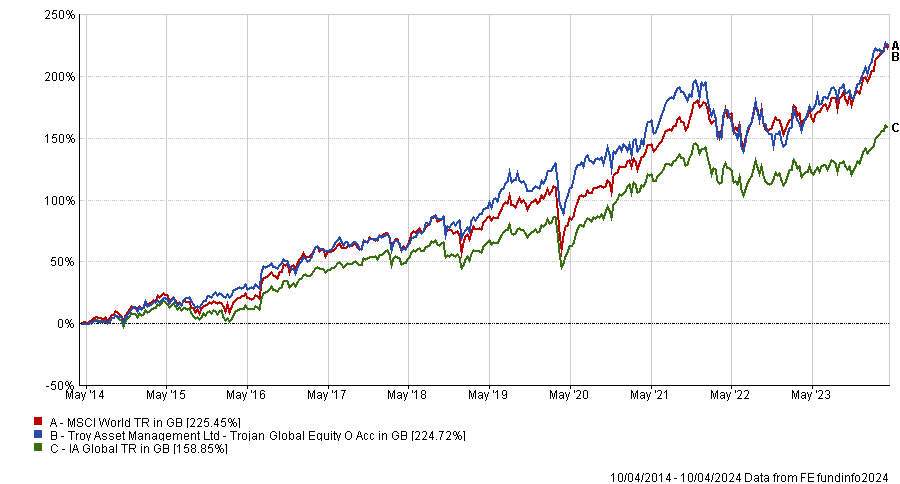Global equity markets look quite hot at present after a huge run up in performance since November last year, leaving investors wondering whether they should try to capture further upside or take profits. At noisy times like these, it can be helpful to take a step back and focus on fundamental principles applied by successful investors, such as Berkshire Hathaway’s Warren Buffett.
Troy Asset Management has espoused Buffett’s famous mantra, “be fearful when others are greedy and greedy when others are fearful”, and developed a complementary approach to long-term investing of its own.
Gabrielle Boyle, who manages the £724m Trojan Global Equity strategy, said Troy’s DNA is “we have time on our side, we can afford to step back from the crowd and take a long view”.
Boyle describes her fund as “a very purist interpretation to our approach at Troy” – an approach can be boiled down to the five guidelines below.
Performance of fund vs sector and benchmark over 10yrs

Source: FE Analytics
Mantra one: Be wary of valuations
With the equity market arguably priced for perfection, Boyle is taking a cautious tack. “Things do feel quite hot,” she observed. “We are living through a pretty extraordinary period.”
To protect and grow capital, investors need to be careful around valuations, she warned. She invested in Adobe in 2022, intending for it to be a long-term holding, but as a valuation-conscious fund manager, she has been proactively taking profits. “The problem with these stocks is we are seeing huge moves.”
Mantra two: Underestimate tech innovation at your peril
Boyle is not, however, avoiding the exuberance surrounding artificial intelligence (AI) and the ‘Magnificent Seven’. With technological change and AI, “I’d underestimate these forces at your peril,” she advised.
The Trojan Global Equity fund invests in Alphabet, which she first bought in 2013, and Microsoft. “We love investing in businesses with very high rates of reinvestment,” she said.
Nonetheless, she is cognisant that the equity market has become highly concentrated after the exponential performance of the Magnificent Seven last year. “We’ve been taking profits on some of these darlings that have done very well and recycling profits into companies that have not done so well.”
Mantra three: Know your limits
Boyle has steered clear of the tech hardware and semi-conductor sector, which she described as the “hottest” area currently but one which is cyclical and capital intensive, with “incredible periods of boom” followed by leaner spells when order rates slow down. “We don’t like the highs and lows,” she added.
“In investing, you’ve got to know the boundaries of your competence,” Boyle said, which is a lesson she learned from the late Charlie Munger (Warren Buffett’s business partner).
The Trojan Global Equity fund invests in big brands that have been around for a long time, selling goods and services that are fundamental to people’s lives, with the capacity to grow and adapt, such as Visa. Boyle has owned the credit card company, which is profiting from the growth in digitalised payments, since 2016.
Mantra four: Look for stocks that have been left behind
Boyle has been investing in “good businesses that got left behind through this extreme period”, adding LSEG, owner of the London Stock Exchange and FTSE Russell, to her fund last year.
FTSE is a fundamentally important business to its clients, she explained. For instance, if a fund manager uses a FTSE index as a benchmark, “you’ve got to show your performance versus the FTSE so you’ve got to pay their bills”.
LSEG was created through the acquisition of Refinitiv, which was completed in January 2021, and Boyle thinks the business has been optimised and better managed since this merger.
LSEG has a lower valuation than Moody’s or S&P Global, which she also owns, because it is domiciled in the UK and it is “not the easiest business to understand” due to its different component parts.
All three financial data companies have a huge opportunity to use AI and large language models to exploit their data, she said.
Another relatively new addition to the fund is RELX, which Boyle picked up last year at an attractive valuation due to the “malaise” of the UK stock market. RELX is “one of the most attractive companies in the UK,” she said. It is highly profitable, cash generative, innovative and “well managed in an understated way”.
RELX develops information-based analytics and decision tools for professional and business customers in the legal, scientific, technical and medical sectors. Boyle thinks that RELX will emerge as a “winner” by using AI to leverage its data.
Mantra five: Invest through discomfort
Boyle has been adding to positions that have underperformed recently including LVMH, which was hurt by China’s slowdown and which she has owned since 2022, and Diageo. The latter experienced high demand for its premium spirits brands during the Covid lockdowns but sales have been weaker since then. Nonetheless, “we believe the premiumisation of spirits will continue,” she explained.
In a similar vein, during the 2022 tech sell-off “we got a lot of stick for owning Meta” but “we lent into that”, Boyle recalled. She increased her fund’s exposure to Meta, which sowed the seeds for performance subsequently.
“Being able to invest through that discomfort is very important for a global equity manager. You’ve got to be able to take a bit of pain,” she said.





